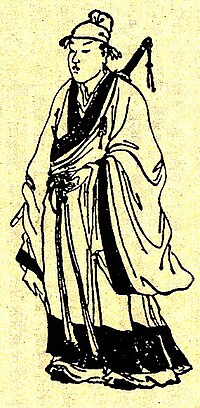Guo Jia
| Guo Jia | |
|---|---|

A Qing dynasty illustration of Guo Jia
|
|
| Strategist of Cao Cao | |
| Born | 170 |
| Died | 207 (aged 37) |
| Names | |
| Traditional Chinese | 郭嘉 |
| Simplified Chinese | 郭嘉 |
| Pinyin | Guō Jiā |
| Wade–Giles | Kuo Chia |
| Courtesy name | Fengxiao (Chinese: 奉孝; pinyin: Fèngxiào; Wade–Giles: Feng-hsiao) |
| Posthumous name | Marquis Zhen (simplified Chinese: 贞侯; traditional Chinese: 貞侯; pinyin: Zhēn Hóu; Wade–Giles: Chen Hou) |
Guo Jia (170–207),courtesy name Fengxiao, was an advisor to the warlord Cao Cao in the late Eastern Han dynasty. Throughout his 11 years of service, Guo Jia aided Cao Cao greatly with his brilliance and foresight, and his strategies were instrumental to Cao's triumphs over rival warlords such as Lü Bu and Yuan Shao. For example, four years before Cao Cao's decisive victory over Yuan Shao at the Battle of Guandu, Guo Jia had already foreseen that Cao would win when he pointed out ten advantages Cao had over Yuan.
The authoritative historical source on Guo Jia's life is the Records of the Three Kingdoms (Sanguozhi), which was written by Chen Shou in the third century. In the fifth century, Pei Songzhi annotated the Sanguozhi by incorporating information from other sources to Chen Shou's original work and adding his personal commentary. Some alternative texts used in the annotations to Guo Jia's biography include: Fu Zi, by Fu Xuan; Wei Shu (Book of Wei), by Wang Chen, Xun Yi and Ruan Ji; Shiyu (Accounts of this Generation), by Guo Song.
Guo Jia was from Yangzhai County (陽翟縣), Yingchuan Commandery (潁川郡), which is in present-day Yuzhou, Henan. As a youth, he was famous for his intelligence and foresight. Since reaching adulthood at around the age of 19, Guo Jia had been travelling around the country and befriending members of the scholar-gentry and other talented persons. He did not associate himself with the hoi polloi and was thus not very well known outside of his circles. However, all those who knew him recognised his talent and felt that he was extraordinary. When he was 26, he served in the Han government as a minor official in the office of the Minister over the Masses (司徒).
...
Wikipedia
